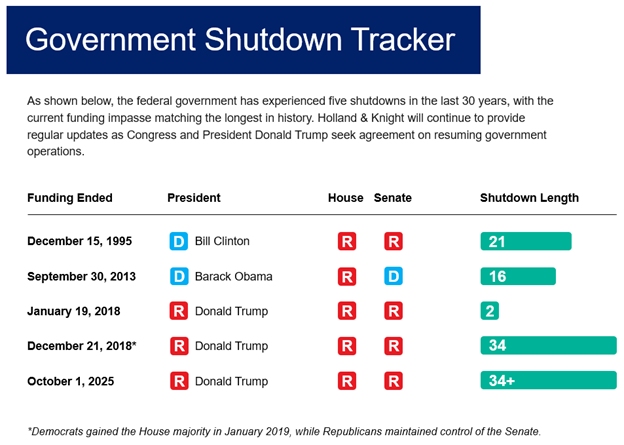- within Government and Public Sector topic(s)
- in United States
- with readers working within the Retail & Leisure industries
Welcome to the Eyes on Washington: Shutdown Briefing. During the federal government shutdown, we will be sharing concise, client-focused updates to help you stay informed on key developments, legislative dynamics and potential impacts to your operations and federal engagement.
Breaking News
With November 21 less than three weeks away, lawmakers soon will be forced to extend the end date for legislation to keep the government open. Republican leaders are considering a continuing resolution (CR) that could stretch sometime between mid-January and March 2026.
In response to a ruling by Judge John J. McConnell Jr. of the U.S. District Court for the District of Rhode Island, the Trump Administration announced it will provide partial Supplemental Nutrition Assistance Program (SNAP) benefits in November as a result of the ongoing government shutdown. Federal judges ordered the use of a $5.25 billion emergency fund, but it falls short of the $9 billion needed to fully fund the program for the month. The administration has no current plans to use additional child nutrition funds to fill the SNAP gap, citing long-term risks. U.S. Department of Agriculture officials warned of delays and disruptions in benefit distribution, with some states potentially waiting months to implement changes. On October 31, the administration moved $450 million into the Special Supplemental Nutrition Program for Women, Infants, and Children (WIC) program.
Status Update
Today marks Day 34 of the federal government shutdown. Negotiations on reopening the government remain stalled.
Congressional Activity
- Democratic Leadership: Remains unified in calling for a renewal of Affordable Care Act (ACA) subsidies. U.S. House of Representatives Minority Leader Hakeem Jeffries (D-N.Y.) said Democrats are standing firm on their healthcare demands as a condition for reopening the federal government. He emphasized the need for a bipartisan spending agreement that addresses what he called the "Republican healthcare crisis." Minority Leader Jeffries also criticized Republicans for refusing to engage in conversations with Democrats during the shutdown.
- Republican Leadership: Led in the U.S. Senate by Majority Leader John Thune (R-S.D.), remains firm in its stance that a clean CR is the best way to reopen the government. Majority Leader Thune also reiterated that he will not advance a rules change to eliminate the filibuster – a move that would allow Republicans to pass a funding bill without Democratic support.
- Bipartisan Engagement: The Senate is scheduled to convene today, but it is not clear if another vote on a funding bill will take place.
Executive Branch Developments
- Presidential Engagement: President Donald Trump called on Senate Republicans to invoke the "nuclear option" by changing Senate rules and scrapping the previously mentioned filibuster to end the government shutdown without Democratic support. In an October 31 interview with "60 Minutes," President Trump said he would talk to Democrats about a possible fix to the ACA if they agree to reopen the government first.
- Troop Pay: On October 31, service members received their end-of-month pay, according to a spokesperson with the Office of Management and Budget. However, some officials, including U.S. Department of the Treasury Secretary Scott Bessent, have said it's doubtful service members will receive pay on November 15 unless the shutdown ends.
- SNAP and WIC Funding: A federal judge ruled on October 31 that the USDA must disburse full or partial SNAP benefits this week. As a result, the Trump Administration will issue partial food stamp payments this month to roughly 42 million Americans as the government shutdown enters its second month. In a court filing, the administration said it would use emergency SNAP funds but not tap additional resources to ensure full November payments. On October 31, the Trump Administration quietly readied $450 million to fund WIC as the government shutdown continues.
- Head Start Funding: The government shutdown is forcing the closure of dozens of Head Start centers, leaving working parents scrambling for childcare and cutting off preschool access for some of the nation's most vulnerable children. Without expected federal grant payments, many centers are closing indefinitely or relying on emergency local funding, disrupting services such as meals and therapy for low-income, homeless and foster care children.
Key Milestones
- October 31: House staff missed their paychecks, but Pentagon workers received theirs. Members of Congress will continue to receive pay throughout the shutdown.
- November 1: The ACA open enrollment period began. Participants may see premiums increase significantly. The House-passed CR does not include an extension of ACA tax credits, which are set to expire at the end of the year.
- November 4: Off-year gubernatorial elections are held in Virginia and New Jersey.
- November 4: The government shutdown will become the longest in history, beating a 34-day-plus record set during President Trump's first term.
- November 7: Non-exempt federal employees will have worked one month without pay.
- November 15: Military payday.
Strategic Considerations for Clients
- Agency Engagement: Clients should anticipate delays in regulatory reviews, permitting and federal communications.
- Contracting and Grants: Federal contractors may experience payment disruptions and limited access to agency personnel.
- Policy Positioning: The shutdown may create new leverage points in legislative negotiations. Clients with interests in appropriations, healthcare, defense and infrastructure should monitor developments closely.

The content of this article is intended to provide a general guide to the subject matter. Specialist advice should be sought about your specific circumstances.
[View Source]





